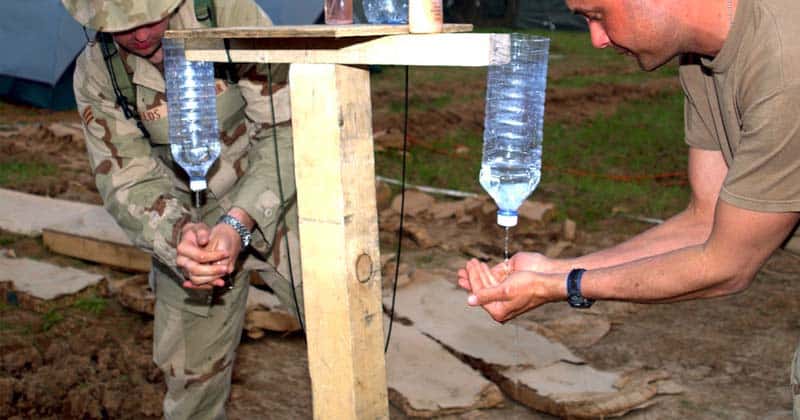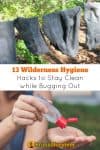Wilderness hygiene isn’t just about getting rid of your stink so your fellow campers don’t have to endure your body odor all day.
Maintaining hygiene in the wilderness is essential to keep yourself healthy and safe.
If you get too dirty, you will get sick, attract bugs, and probably get nasty rashes.
Here are some wilderness hygiene hacks that are great for camping, bugging out, or surviving the zombie apocalypse.
Don’t Skimp on Extra Socks and Underwear
I know you are trying to pack light, and you won’t be able to pack 30 days’ worth of clothes in your Bug Out Bag. But don’t skimp on the socks and underwear!
While it is okay to re-wear dirty shirts and pants, your feet and groin get sweaty fast.
Sweaty, wet clothes can fester bacteria, which means rashes and open sores on your skin. Trust me, you do NOT want this to happen! So pack a few extra socks and undies, just in case.
Rotate Your Socks
On the topic of socks, you should rotate your socks, too. Switch to a dry pair as soon as they start getting sweaty and wet (hang the sweaty ones on your pack to dry out). This will keep your feet dry and prevent blisters.
Change Your Clothes before Going to Bed
Always have a clean pair of pajamas to change into before going to bed. You don’t want to wear dirty clothes to bed because they will get your sleeping bag dirty and because sleeping in dirty clothes will give you a rash.
Bring a Shovel

A small camping shovel is one of the most important things you will need for maintaining hygiene in the wilderness.
Why?
You should dig a hole at least 6 inches deep before going to the bathroom in the wilderness, and then you cover the hole up with dirt when you are finished.
Otherwise, you risk serious contamination around your campsite.
We reviewed the Gerber E-tool, which would be ideal for this task.
And remember, your designated bathroom area should always be about 200 feet from camp.
Female Hygiene
After numerous backpacking trips, I’ve learned a few things about female hygiene in the wilderness.
Here is a quick overview but I go more in-depth in this post.
- Use a menstrual cup. It will save you space in your pack. Avoid using pads because there will be too much moisture, which can cause rashes.
- Pack enough toilet paper. Wiping with leaves may be more natural, but they are abrasive and dirty, which can lead to yeast infections.
- Wear loose clothing. Avoid synthetic materials for your panties. Otherwise, you will get chaffed, and the moisture from sweating will cause yeast infections.
Say NO to Deodorant!
As much as you love your stick of Old Spice, leave it out of your wilderness survival pack.
Why?
Because deodorants contain various ingredients that bugs (not to mention other wildlife) find irresistible. You will soon find yourself covered in itchy bug bites, and itching leads to open sores, which leads to infections…
If you are worried about stinky armpits, then just wash your pits well with soap and water. Or, bring along a baggie of baking soda and rub it under your armpits.
Wash Your Hands!

The standard hygiene rules often get thrown to the wind in wilderness survival situations.
Always wash your hands
- After going to the bathroom
- Before cooking meals.
Otherwise, some gross fecal matter is going to get into your food and can make you sick (don’t even try to blame it on contaminated drinking water!).
Don’t have a water source for washing your hands?
Instead of wasting your precious water reserves for hand washing, bring a bottle of hand sanitizer. The ethyl alcohol in it will kill germs on contact.
Alternatively, look at these methods of washing your hands without running water.
Bring a Bandana
When you pack for survival, you’ve got to pack light. So, every single item of clothing has a good purpose. A bandana is a great thing to pack because it can serve so many purposes:
- Protect your head from sunburn
- Use it as a bandage
- Use it as a tourniquet’ Learn how to use a tourniquet.
- For marking a trail
- And dozens of other uses
As far as hygiene goes, a bandana makes a great washcloth. So bring one along instead of a bulky towel.
Pack Dental Floss
Dental floss is another great multi-purpose item to pack in your survival bag. It can be used for fishing line, sewing up a torn backpack, and more.
But don’t forget to use its intended purpose of flossing your teeth, too!
After a few days of slacking on dental hygiene, your gums can become swollen and inflamed. And this will HURT like hell, making it hard to eat.
Bathing in Rivers and Streams
Rivers and streams are great for taking baths! But try to avoid areas of stagnant water for your bath.
Bacteria and algae fester in areas where water doesn’t move.
Also, avoid any areas which are breeding grounds for fish or insects.
File Nails with Rock
Long nails can be a hazard when you are trying to survive. They get dirt built under them, which can mean bacteria getting into your food.
A long nail can also easily break, and having jagged nails will hurt!
Keep your nails trim and smooth by filing them with a rock or on concrete.
Tea Tree Oil Insect Repellent
Mix 1 part tea tree oil (which you can buy at health food stores and natural pharmacies) with 2 parts water. It not only works as a natural insect repellent (good for ticks, too!) but helps kill bacteria on your skin and keeps you feeling fresh.
Keep Trash Away from Camp!
Not only should you poop 200 feet from camp, but you should keep your trash far away too.
Having trash around camp will attract unwelcome bugs and wildlife.
Do you have any wilderness hygiene hacks to share? Let us know in the comments.



If you get separated from your toothbrush, a chewed twig is a decent substitute, and splinters make good toothpicks
In the Pacific Northwest and some other places, spruce is a good choice… it has long fibers (make a good brush) and antiseptic properties. Pines and cedars (cypress) work almost as well.
A simple ‘hack’:
After bathing and before toweling off, wipe as much water as you can from yourself with quick, downward swipes from the top down. This reduces the wet going into your towel… you get drier = stay warmer, and the towel dries more quickly for the next task.
Wringing is hard on clothes. If you’re washing cloths in a camp, consider setting up a press to squeeze water from wet clothes. This saves a LOT of drying time.
A simple press can be a small-ish, plank-like (at least one flat-ish face helps) log to do the pressing… hook one end under a root and set up a stone or 2nd flat log as an anvil about 1/4 plank length from the root (adjust as you like). Clothes go on the anvil in a small heap. Pull down or sit on the plank to squeeze the heap.
I assume most people know this but you can wash a greasy pan with the ashes from your wood fire. soap is made from wood ash and fat
A lot of people don’t know that! Good tip.
Yep. Especially if using mostly white ash (less black, which is carbon). A pinch or two of sand adds abrasive.
Tobacco is great when something has already infested your body inside or outside. I had a bowel infestation once and smoked ca. 2 cigarillos every two to four days or so. Whatever was in my bowel quickly realized that my body was probably not as much a good settling and feeding place as they thought initially and step by step left again.
In addition to that, I read that tobacco has in past times often been used to treat wounds or skin problems. But I haven´t tried that personally, yet.
Of course, my comment is not meant as an advertising for long term tobacco abuse, as everyone knows what bad things regular smoking can do to the health.
Interesting concept but not sure there is any scientific evidence to back this theory up. Would love to hear some more opinions on this.
My grandma used tobacco on a bee sting once for me when I was a child.
charcoal is great for brushing teeth; whitens also. Also tee tree and baking soda ( 1 drop to a baggie .) awesome for washing skin and softens too. Natural antibacterial washing soda for cleaning clothes also. Mix with 2 drops of dish soap in addition to the baking soda and tee tree oil. Use this when I camp out.
Simple but effective. Thanks for the tips they could come in very useful.
Good article and ideas! An old friend who is heavy into historical research and recreation wwii and the war of northern aggression what most of you would call the civil war and tried to play a medical person from then. Unfortunately he has no understanding of medical even in those times. anyway he is infamous for stating to the kids that come through the displays that sanitation is “optional ” Sadly he does not listen to reason.
That is a sadly misguided friend! I hope you put him right.
Washing pots pans and utensils tip, before scrubbing with soap and water, use a handful of dried grass or leaves and a little soil. Acts as a scouring pad to get the worst off. Use less soap and water in the long run
Nice tip.
You can actually use your jeans for your nails, denim won’t file them down but will smooth out rough spots. Try not to use anti bacterial soaps more than necessary, strips natural oils (dry skin can crack) and kills off the good bacteria. Olive or coconut oil are good choices. Can also mix your tea tree with either oil, just a few drops goes a long way, don’t use pure, very strong, lots of uses.
Awesome tips. Thanks